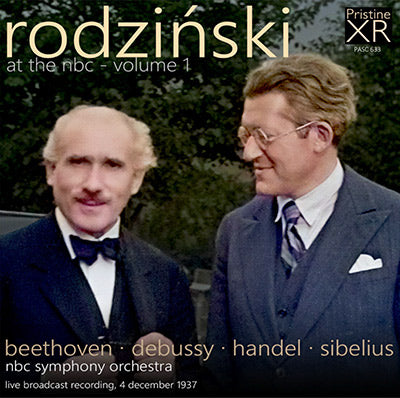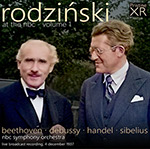
This album is included in the following sets:
This set contains the following albums:
- Producer's Note
- Full Track Listing
- Cover Art
- "My Father Recalled"
- NY Times Review
Rodziński at the NBC - an Introduction
After initially refusing to accept any American engagement, Toscanini changed his mind and took an offer from the National Broadcasting Company of a new specially-created orchestra for a series of radio concerts. Toscanini, who was enraged at the New York Philharmonic's board for not following his advice and engaging Barbirolli to succeed him at the Philharmonic instead of Rodziński, insisted that David Sarnoff, president of RCA, hire Rodziński to recruit and train the new NBC orchestra. Toscanini was a great admirer of Rodziński, speaking of him on several occasions as his successor. Furthermore, he recognized that Rodziński had already acquired a reputation as an outstanding orchestra builder with the Los Angeles Philharmonic, the Cleveland Orchestra and later with the New York Philharmonic. A long article in the Herald Tribune under the title "Tuning up the Band" described Artur's five weeks of training the new NBC orchestra:
Eagerly awaiting the arrival of Maestro Arturo Toscanini, 92 musicians have turned the largest studio in Radio City into a beehive of activity as they rehearse under the baton of drill master Artur Rodziński. The assignment to organize the orchestra… is to Mr. Rodziński "the answer to a conductors dream… to me this commission brought nothing but pleasure. It is the answer to a lifelong dream." During the five weeks’ intensive rehearsal Mr. Rodziński will put the musicians through their musical paces, molding the distinguished individual talent into a unit he hopes will become recognized as one of the finest symphonic bodies of its kind. The orchestra is unique in this respect, the conductor added, insofar as it came into being in full bloom rather than through the process of various stages of growth that usually mark the development of many other symphonic groups. "I am more than elated with the progress up to now. When I heard the strings after the first rehearsal I wept for pure joy"
On November 2, 1937 Rodziński conducted the debut broadcast which had been tagged a "dress rehearsal" followed by 10 concerts during the first two seasons, sharing the podium with Pierre Monteux and Arturo Toscanini. This release is drawn entirely from the first full concert given by Rodziński and the orchestra on 4 December 1937. It was the orchestra's fifth broadcast, following the short Rodziński 'dress rehearsal' of 2 November and three full concerts given under Monteux. Toscanini's first NBC concert took place on 25 December 1937.
Richard Rodzinski (with additional material from Halina Rodziński, Our Two Lives, 1976)
RODZIŃSKI at the NBC Vol. 1
1. RADIO Introduction (1:24)
HANDEL-HARTY Water Music Suite
2. I. Allegro (2:30)
3. II. Air (5:32)
4. III. Bourée (0:42)
5. IV. Hornpipe (0:57)
6. V. Andante espressivo (3:57)
7. VI. Allegero deciso (3:11)
8. SIBELIUS Pohjola's Daughter, Op. 49 (16:00)
DEBUSSY Nocturnes
9. I. Nuages (9:31)
10. II. Fêtes (6:04)
BEETHOVEN Symphony No. 5 in C minor, Op. 67
11. 1st mvt. - Allegro con brio (6:02)
12. 2nd mvt. - Andante con moto (10:12)
13. 3rd mvt. - Scherzo. Allegro - Trio (5:06)
14. 4th mvt. - Allegro (8:21)
NBC Symphony Orchestra
conducted by Artur Rodziński
XR Remastered in Ambient Stereo by Andrew Rose
Cover artwork based on a photograph of Artur Rodziński and Arturo Toscanini
Broadcast of 4 December, 1937
Special thanks to Richard Rodzinski
Total duration: 79:29
Artur Rodziński: My Father Recalled
Our relationship could not have been closer and more loving but beyond that, given the choice of going out to play with my friends or remaining with my father to go for a stroll I always chose to remain with him to enjoy that energy which, despite his being very ill after having suffered multiple heart attacks, still created an excitement that drew you in.
It was that same excitement that audiences, critics, and orchestra musicians alike so frequently spoke of. Members of the orchestra said that during recording sessions as the studio red light would go on and when generally players and conductors would concentrate on cautiously getting everything right, my father instead would opt for making the recording with all the intensity of a live performance.
Even rehearsals were highly charged and though often quite stressful they remained exhilarating. My father was well-known for rehearsing with lightning speed, efficiently, using limited precise words, and could accomplish more and in fewer rehearsals than most of his colleagues.
Although occasionally referred to as a martinet he was profoundly human and respectful in his relationship with the players. I remember once during a rehearsal he repeatedly demanded that the horn section play a very long phrase in one breath. A young fourth horn player, unable to execute the phrase finally broke down in tears. My father called a break, went up to sit with the young man, and calmly spent time going over and over the passage until the player, now beaming, found that he was able to do it.
My father was an uncompromising perfectionist and suffered for it. He restlessly was looking for better be it in musical matters or even in human relations. He was invariably unsatisfied with his performances. This inability to compromise spilled over into his conflicts with management concerning his demand for artistic conditions that allowed him the freedom to achieve the highest standards be it in terms of the choice of repertoire and soloists, rehearsals, the number of string players and so forth. His unflinching integrity, for instance, prevented Westminster Records which was pioneering stereo recordings from releasing some of his discs.
During a playback session the producer tried to convince my father to accept the technology. He adamantly refused saying he could hear the sound coming from left and right but there was no depth and refused to lend his name to these records if they were issued in stereo. He then turned to me and said "you see, we could have sold more records if I had agreed to release them but I've always insisted on what I feel is right and honest. This ‘stereo’ is still an artifice."
I will best remember what my father was all about for what he said on his deathbed. Following his triumphant and now legendary performances of Tristan that he conducted in Chicago and which he knew his ailing health would not allow him to survive, among his final words were ""perhaps there are others who might conduct Tristan better than I but I can promise you that nobody could love it more."
Richard Rodzinski, 2021

